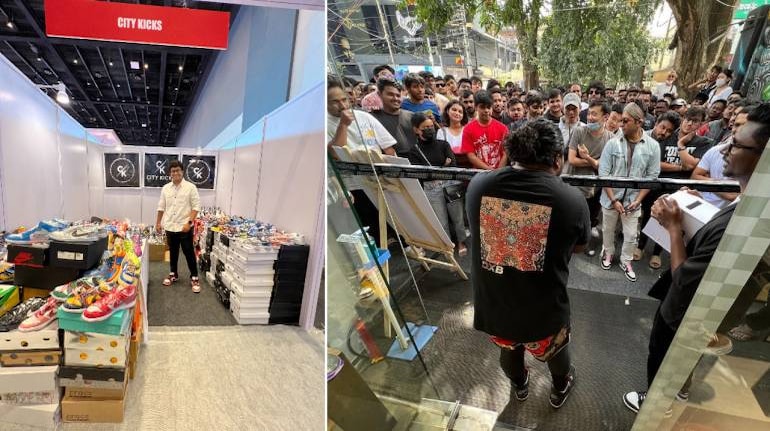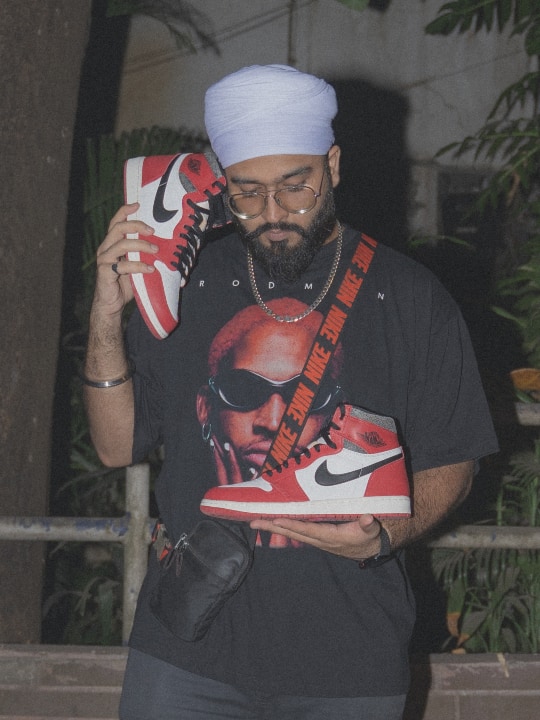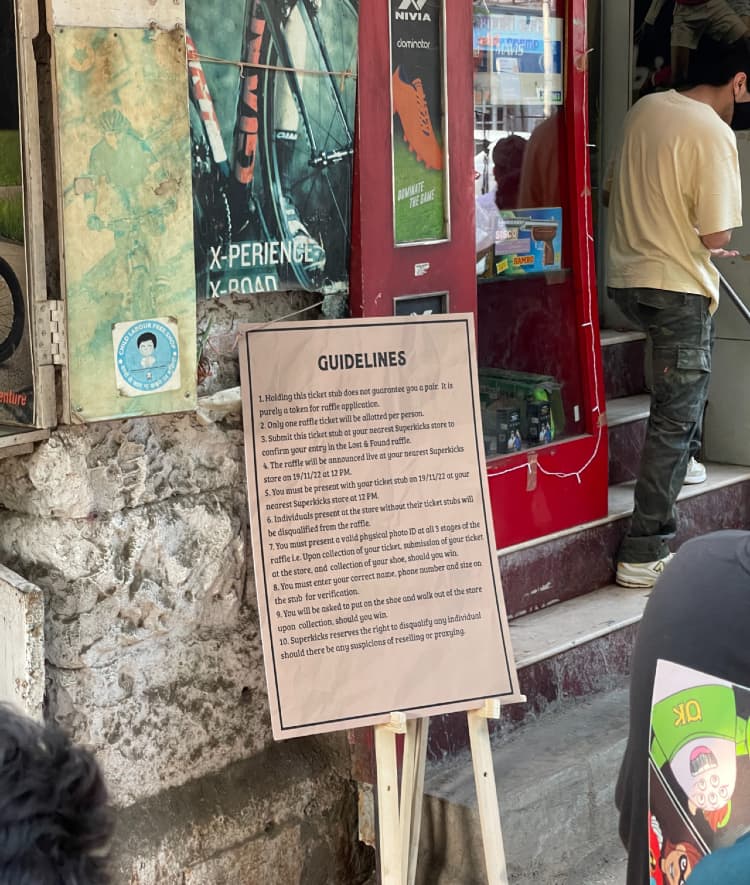



Air Jordan 1 Retro High ‘Chicago Lost and Found’, among the most coveted sneakers of the year, were launched by Nike across India on November 19. Nike priced the sneakers Rs 16,995 a pair in India. But customers like you and me will buy them at no less than Rs 35,000-40,000.
How so, you ask? It is all thanks to resellers.
Try as you might, a sneaker-head will never tell you the price of their sneakers. They are an asset which appreciates in value over time. Most you may get in response is a sly secretive smile. Those who know, know.
 Harmanpreet Sandhu of Free Society, Bandra.
Harmanpreet Sandhu of Free Society, Bandra.
The sneaker community is swelling in India, and with it swells the number of people who cater to it. Unlike most retail goods, the sneaker industry does not stop at retailers. In fact, many consumers don’t buy their pair directly from retail stores. It is the resellers who seal the deal.
Resellers are collectors of one-of-a-kind sneakers. They buy most of the pairs from the market as soon as they are launched. “These sneakers come in very limited quantities to India,” Nikhil Jain, a 30-year-old reseller, explained. “Resellers like us buy them and keep them as an asset before we can sell them at a premium. The longer we keep them, the more the expected profit.”
Less supply and more demand mean a high price. This highschool-level economics is just what you need to understand this entire business of reselling.
So, in the case of ‘Chicago Lost and Found’, over 5 lakh sneakers were produced to be distributed worldwide. India got around 10,000 pairs. These sneakers are considered to be one of the most affordable. Resellers stand to gain a profit of over 135 percent by reselling just one pair. In a year, with the expected reselling value at Rs 1 lakh, this profit margin will cross 500 percent.
According to Statista, the worldwide sneaker market value is $72.27 billion, of which Nike alone contributes $46.7 billion. India accounts for $2.60 billion of this revenue. The sneaker resale market value, on the other hand, is $6 billion across the world and is expected to rise to $30 billion by the end of this decade. Jain, the face behind his reselling company City Kicks, is a proud part of the mania.
All sneakers via Nike come to India through three retail companies: Nike, VegNonVeg and SuperKicks. Apart from the online availability, these sneakers are also available in physical stores in Mumbai, Delhi, Hyderabad and Bangalore. These retailers publicly announce the launch of the sneakers in the market. Anyone can buy them at retail price, provided they are fast enough. Sometimes, the stock lasts for days but sometimes barely a few minutes. You can secure yourself a pair in three ways:
One, book the sneakers online.
Two, raffle and hope to get lucky. Like in Mumbai in the case of ‘Lost and Found’, many had lined up outside the city’s oldest sports store Wagle Sports, which was chosen as a host by SuperKicks, to acquire raffle tickets. Only a few in the line of hundreds on November 16 actually got the tickets. The line started again the next day for a given duration. This went on till November 19 when they announced live the winners who could buy a pair of these sneakers. Raffle tickets are free of cost. You spend only if you win.

Three (and this happens if retailers choose to directly sell sneakers instead of raffling) line up outside the stores for what may take days and wait your turn.
Naturally, the resellers residing in the above-mentioned cities get an upper hand in the second and third cases. But remember that one person can buy only one pair of sneakers at a time, which also must be of their size only.
“I once stood in the line for three days straight,” said Jain. He was unable to secure a pair even after the long wait, but there was a silver lining to this grey cloud for him: it was a gathering of the community he so loves. He said with no hint of regret, “All likeminded people in the line got together and talked about sneakers for 2-3 days.”
He also added that it is because of the sneaker community that rappers like Divine and Gully Gang, two of his regular customers, are like buddies to him today.
Jain, who also owns a clothing store as his full-time business, sells around 150 pairs of sneakers monthly. The profit he once earned from only one of his clients was so huge that it bought him a Kia Carens (Rs 10 lakh onwards). “If you buy a pair of sneakers at retail price, the minimum profit you can expect (by reselling) is up to 50 percent. There is no maximum. It can even be a thousand percent.”
However, he clarified that not everyone can start doing this. One needs to have a minimum of Rs 15,000 in hand every day to spend on a pair whenever the launch is announced. The profit is not immediate either. The resellers need to store the sneakers until they get the right buyer at the right price. He said, “I once heard that reselling can be a rich man’s hobby but not a poor man’s business.”
 Guidelines for how to use the Raffle tickets to buy the Air Jordans at SuperKicks on November 19, 2022.
Guidelines for how to use the Raffle tickets to buy the Air Jordans at SuperKicks on November 19, 2022.
No business comes without risk. Sometimes, these sneakers don’t sell. And that’s where 22-year-old Harmanpreet Sandhu comes to the rescue.
Sandhu, one of the early ones to once take up reselling, is today the manager of Mumbai’s famous streetwear store in Bandra called Free Society. “Everybody wants to make a living out of something they love so that the work doesn’t bore them. I got that early in my life,” he said. A diligent pop culture follower, Sandhu is smitten by hip-hop. And the sneaker culture? “It’s love,” he says.
Also resellers, Free Society is a little higher in the hierarchy. “We don’t directly purchase from retail stores. We deal with a third party,” explained Sandhu. If there are sellers who want to give away their unused pair of sneakers or resellers who are unable to find buyers, big resellers like Free Society sells those for them at an agreed margin.
Sandhu believes that one should know what they’re buying and why there’s hype around that particular model. He calls himself a culture promoter. He, along with Free Society, strives to make the history of everything in his store available to customers. “Free Society tries to keep the margin at its lowest because we are culture-driven. We want maximum people to get the shoes instead of us making a (hefty) profit.”
To put things in perspective, Sandhu explains that the store has an estimated margin of Rs 5,000-6,000 per pair. They sell a minimum of 100 pairs per month, which may sometimes also reach 1,000. “As for other resellers,” he says, “if they can sell fifteen pairs of sneakers monthly, they would easily be earning up to Rs 50,000-60,000”.
For Sandhu, it all started with the popular streetwear brand Off-White and its collaboration with Nike called ‘The Ten’. In these collaborations, Nike allows the second party to design the sneakers with them. “When they released the ten pairs of sneakers, I was like kya kar rahe hain yaar yeh log!” His awe remains unshaken even today. He is of the firm belief that one day he will also collaborate with Nike and release his version of Jordan. “It is going to be called Air Harman 1,” he beamed.
Who would have thought that gold could one day be compared with sneakers and, in the opinion of many from the sneaker community, lose? “Gold is boring,” said Harman.
“It could never excite youngsters as much as sneakers,” affirmed Jain.
Discover the latest Business News, Sensex, and Nifty updates. Obtain Personal Finance insights, tax queries, and expert opinions on Moneycontrol or download the Moneycontrol App to stay updated!